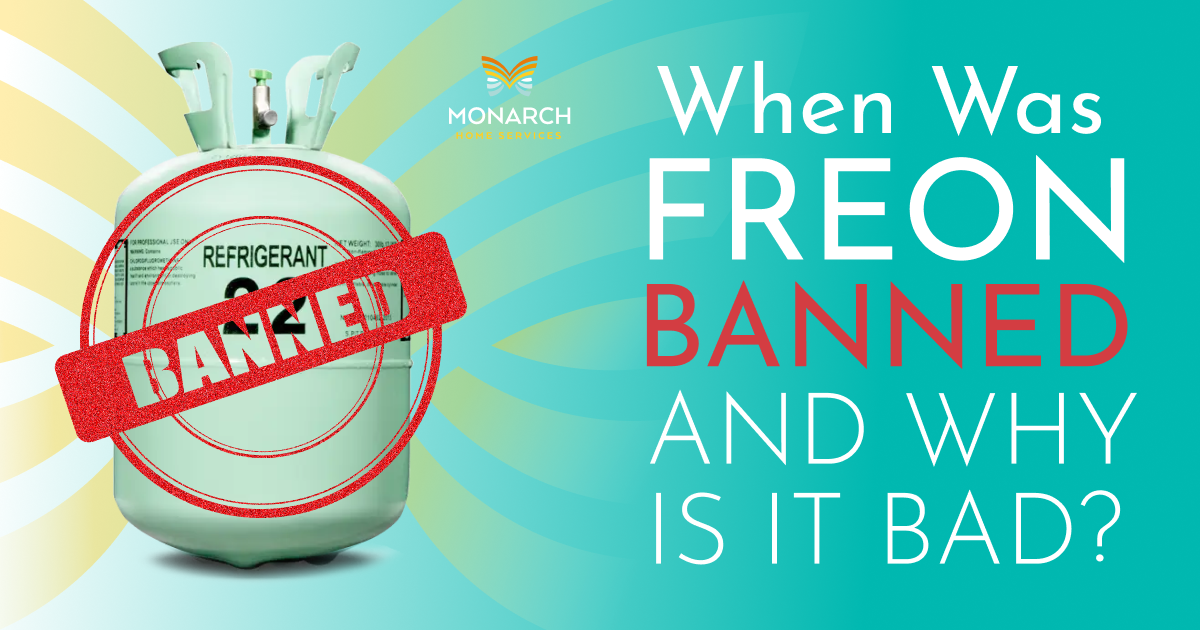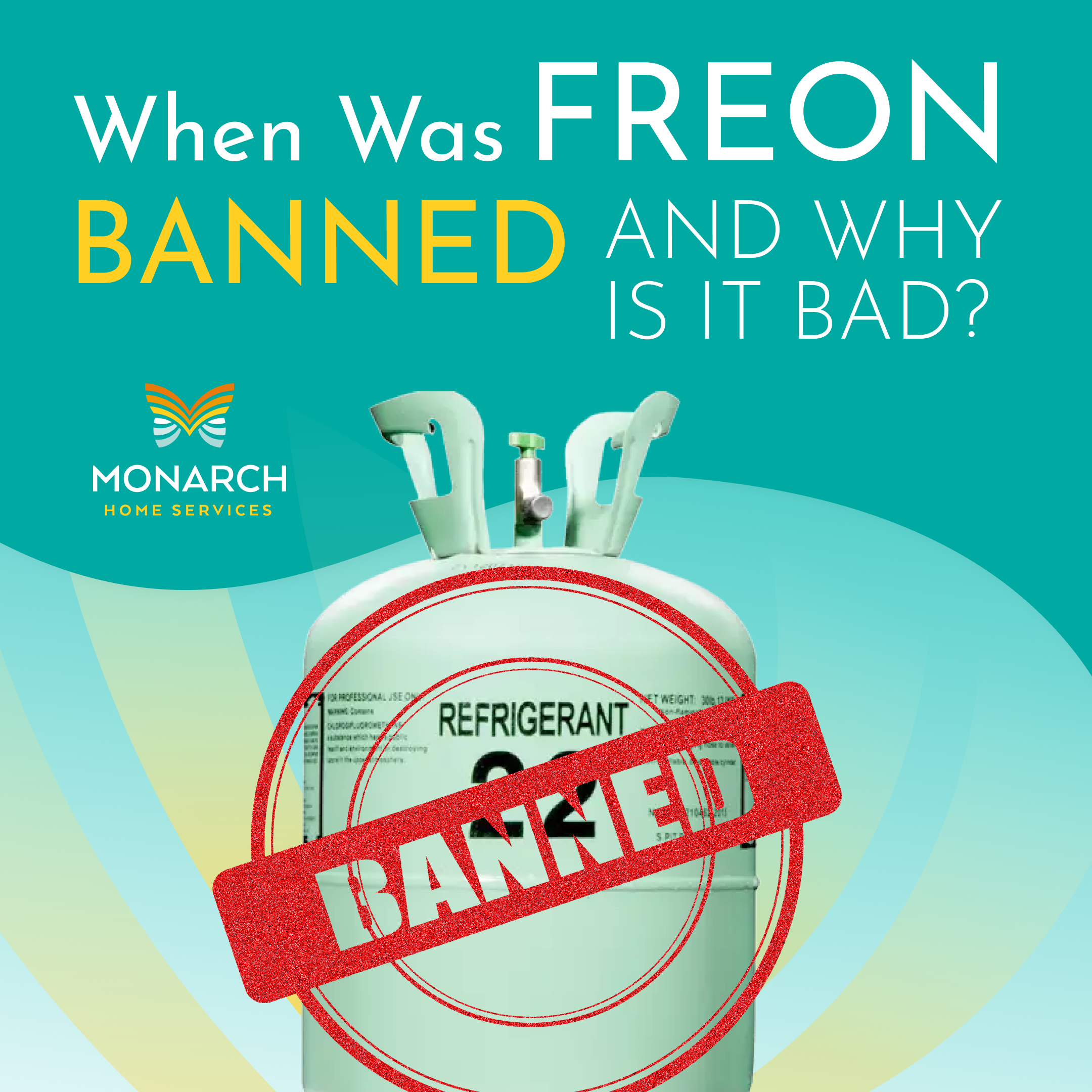
Freon, a brand name for refrigerants used in air conditioners, was introduced in 1930 and officially banned in the United States on January 1, 2020. Also known as R-22, it’s a chlorofluorocarbon (CFC) that studies found to be harming the environment. But what was Freon doing that caused it to be phased out? And if you use an older AC, must you buy a new one? We’ll go into the details as to why and when Freon was banned and what’s so bad about it.
History of the Freon Ban
Restrictions on Freon began in 1987 with the Montreal Protocol. In 1992, the U.S. Environmental Protection Agency (EPA) began phasing out R-22. It was banned from all new cars sold in the country beginning in 1995 and stopped being used in new air conditioning systems, heat pumps, and refrigeration systems in 2010. With the 2020 ban, no additional Freon could be produced or imported.
The phased approach allowed for a gradual replacement of Freon. As aging air conditioners need to be replaced, newer units that use R-410A refrigerant (which does not deplete the ozone layer) are installed. Repairing old ACs can be expensive, and fixing one with a Freon leak is even more so, as supplies of R-22 are becoming scarcer and increasingly more expensive.
Why Is Freon Bad?
When Freon was banned, the EPA had already done years of research on its harmful effects. Here are the top reasons why Freon is bad:
Freon Damages the Ozone Layer
A combination of carbon, hydrogen, fluorine, and chlorine, Freon was found to be damaging the ozone layer. Its CFCs break down in ultraviolet (UV) light, and chlorine bonds with ozone molecules. This process led to the breakdown of the ozone layer, allowing more dangerous UV rays to reach the Earth’s surface. In 1985, researchers found an ozone hole over Antarctica, which many believe to be disappearing with international efforts to phase out CFCs.
Freon Contributes to Global Warming
Freon is considered a greenhouse gas. According to the California Air Resources Board, R-22 has a 100-year Global Warming Potential (GWP) of almost 2,000 times that of carbon dioxide (CO2). One pound of R-22 is nearly as potent as one ton of CO2.1 But R-22 is just one of many refrigerants considered to be potent greenhouse gases; R-404A is more than twice as potent while various others may soon be restricted due to their high GWP or identification as ozone-depleting substances.
Freon Is Harmful to Human Health
Exposure to Freon gas can lead to refrigerant poisoning. Tasteless and mostly odorless, it can block oxygen from reaching your lungs and cells if deeply inhaled. Mild exposure can cause eye/ear/throat irritation, headache, nausea, vomiting, cough, and dizziness. If Freon gets on your skin in liquid form, it can cause frostbite. It can also cause a chemical burn.
Inhaling a high concentration of Freon can be fatal. If you’re regularly exposed to high amounts or inhale it on purpose, the effects include breathing difficulty, fluid buildup in the lungs, and organ damage. Symptoms of severe poisoning include a burning sensation from the esophagus, vomiting blood, labored breathing, a decreased mental state, irregular heartbeat, loss of consciousness, and seizures. In addition, some chemicals in refrigerants remain in the body for a long time and can damage the liver, brain, and other organs.
Refrigerant poisoning requires immediate medical attention. Move an affected person to a location with fresh air, and then call 911 or the National Poison Control Hotline (1-800-222-1222). The person’s vital signs must be monitored in the emergency room, and they must often receive life-saving treatments.
What Do I Do If My AC Uses Freon?
When Freon was banned, it didn’t become illegal to run an air conditioner that requires it. But the cost of a recharge is already extremely expensive and the cost is only getting higher as supplies diminish. To avoid high repair costs, consider replacing the unit with an approved, energy-efficient system before a breakdown occurs. Modern air conditioners are designed for greater efficiency, while newer types of refrigerants more effectively absorb and transfer heat, improving temperature control and comfort.
Contact Monarch Home Services
If your old air conditioner still uses Freon, consider AC replacement and installation from Monarch Home Services. Our EPA- and NATE-certified technicians are familiar with all top brands. They help homeowners throughout Bakersfield, Fresno, and the rest of Central California determine when AC replacement is necessary and find and install brand-new cooling systems. To request service and learn more about our fair pricing, promotions, and financing options, call (661) 215-6573.
Source:


